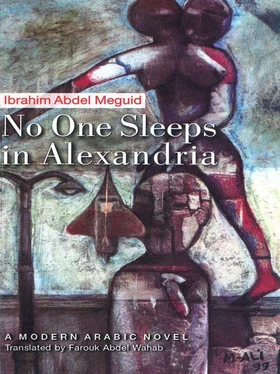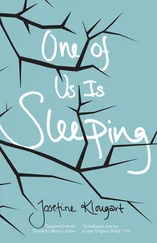“Look at Clark Gable!” Camilla said to Zahra.
“Who?”
“Clark Gable.”
“Is that the man or the woman?”
Camilla laughed. “The man, of course. The woman’s name is Joan Crawford.”
Zahra fell silent for a few moments then, washing her hands of the whole affair, said, “These are difficult names.”
“The name of the film is The Sinful Desire” Camilla told her.
“Behave, girl!” Sitt Maryam shouted from behind her.
Everyone fell silent. Zahra thought about this indomitable girl who had been so sad the past few months and who had cried when the Germans entered Paris. What was it that made her regain her gaiety? She must have gotten out of her predicament. Zahra suddenly realized that she should not have looked at these posters for the movies this time. She had decided that the last time, when she saw in the picture an almost-naked woman jumping into the sea. This time she saw the actor with the trimmed mustache embracing the actress, boldly bending over her and almost kissing her. How could they take these wanton pictures and display them in the streets for every woman and girl to see? She backed up from the window and said, “Come with me, Camilla.”
Camilla walked behind her to Zahra’s room. Zahra had been holding her daughter by the hand all that time. She let go of her hand and uncovered the pot and with a ladle took out the chicken liver, put it on a saucer, and offered it to Camilla. Camilla was surprised but did not turn it down. Zahra told her, “Your uncle Magd al-Din has started a new job today.”
“Congratulations! So that’s what you’re celebrating!”
After a few moments Camilla asked, “Does every wife love her husband the way you do, Sitt Zahra?”
“The way I do? No. But who else does a wife have besides her husband? Do you learn something else in school?”
“We learn that exactly in school, and then some.”
“What is it that you like about that actor with the difficult name?” Zahra asked her suddenly.
Camilla was chewing the hot chicken liver fast and blowing on her hands. After she was done she answered, “His eyes — his eyes are so deep, Sitt Zahra.”
They both fell silent. Zahra thought about the age difference between them, only five years. Zahra was twenty-one, but Camilla was too daring for a sixteen-year-old girl. What would they do to a girl like that in the village?
“I’m afraid for you, Camilla.”
“What for?”
“I don’t know. I’m just afraid.”
“Don’t be afraid. The mischievous live longer,” Camilla laughed and left the room.

The end of the school year was the reason Camilla had regained her gaiety. The ordeal was over. Perhaps she had needed no more than one other meeting to fall forever. How could she permit herself to get into this relationship, doomed to end in failure or death from the very beginning? Whoever said that one could joke about matters of love? But they were good days anyway. It all began in a contest between the boys of Abbasiya and the girls Nabawiya Musa held at Ras al-Tin school. Whose fiendish idea was it? The headmistress of Nabawiya Musa School was challenging society. She was a woman of liberal ideas, though she was strict with the girls. She asked for the impossible and was confident that she would get it. She would have the girls compete against the boys and was confident that the girls would hold their own. What happened was that he was paired with her. The literary and scientific questions were hard, but he was amazingly capable. He recited verses from Keats in English and Baudelaire in French, helped his teammates out, and was the reason the boys of Abbasiya school scored such a stunning victory that the Nabawiya Musa girls cried in agony. She could not deny that she thought about him for a few moments that night. She was haunted by his sad, pale face, by his simple clothes, clean but suggesting poverty, as did his slightly yellow face. His eyes were always moist, almost tearful the whole time, sad but contented eyes. That was what attracted her. He was a truly charming young man.
She went to sleep thinking that she would not see him again. But the following day she saw him standing on the sidewalk opposite the gate of her school. She froze for a moment. She realized that he had come to meet her. She held onto Yvonne’s arm and would not let go. When she got off the streetcar at Karmuz Bridge she saw him getting off from the other car. He stood for a little while, watching them as they walked down the slope leading to Ban Street in Ghayt al-Aynab, then he walked along the Mahmudiya canal in the direction of Kafr Ashri.
He started stopping by her school everyday, just to look at her. Whenever she changed her route on her way home, he would be there. Finally she stood at some distance from the school and looked back at him. Yvonne was sick that day. It was as if he had prepared everything in advance. He came over to her right in the middle of the street with a necklace of white jasmine and in front of the passers-by, he slipped it over her head and around her neck. She stood totally still and he took her by the hand, and they walked to the Shallalat gardens.
“Where did you get the courage to do that on the street?”
“Poetry. I love all the crazy poets. Do you know the love story of Yesenin and Isadora?”
“No, I don’t know Yesenin. I know that Isadora was an extraordinary dancer.”
“Do you know anything about the French surrealists?”
“A little.”
“Well, those surrealists do whatever they want, without fear.”
They sat under the old, thick, tall laurel trees.
“I don’t know how I gave in to you,” she said.
He was looking at this meek hen with wide eyes and could believe neither what was happening nor what he was saying.
“But—” she added.
“I know, you’re Christian — you’re wearing a cross. I’m a Muslim. That’s how it is. Where will it lead? I don’t know.”
That day he read to her some of the poetry of Baudelaire, Rimbaud, and Éluard, of whom she was hearing for the first time.
He said to her, “My beautiful one, we must see the rose of your white milk bloom. My beautiful one, hurry, be a mother and give me a child in my image.” When he saw that she was embarrassed, he said, “All the flowers of the fruits light up my garden, the trees of beauty and the trees of fruits. I work alone in my garden as the sun burns, a dark fire on my hand.” He told her that what he had just said were verses from a poem entitled “Poems for Peace” that Éluard had written after the Great War and in which he was celebrating the soldiers’ return home. That they were not love poems. She was surprised at herself: how could she be listening to this sad lover of poetry when she herself was a merry free spirit, he the Muslim and she the Christian? But she knew that the end was near at hand and that she herself had better end it.
She gave in more. They went together to the gardens of Nuzha and Antoniadis in the midst of the winter flowers. Yvonne now knew the story and begged her sister to spare her and to spare herself. Camilla would hide for a while, then find herself looking for him when she got out of school. As they were walking among the camphor, oak, towering Indian palms, and the bare acacias that would come into full bloom with the advent of spring, he asked her, “How old are you?” “Sixteen,” she said. He told her that he was seventeen, that his life’s dream was to finish secondary school and university, then go to the Sorbonne. Taha Husayn’s educational journey was what he wanted to model his life on. It was not particularly important that he get a doctorate — what he most cared for was to walk in the Latin Quarter, visit the Louvre, Orsay, the Pantheon, the Eiffel Tower, and Montmartre, and on the banks of the Seine, to read poems that soared in the air. In the gardens that day, she let him give her a quick kiss, after which she asked that they go back without delay. The naive lover did not realize that her body almost burst free and held on to him, almost betrayed her and defeated her ability to control it.
Читать дальше













